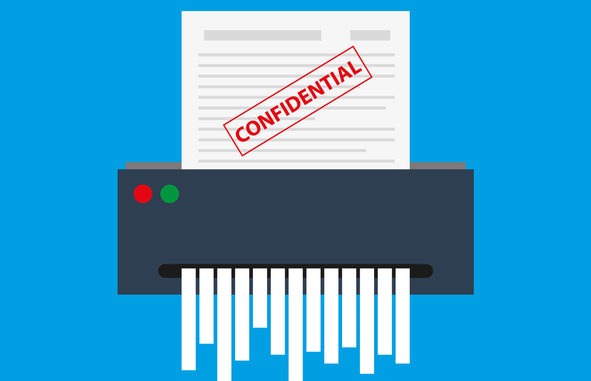
The pandemic has meant that many more people are dealing with confidential documents at home – but there are plenty of ways dealers can help businesses to stay GDPR-compliant, and ensure that documents are stored or disposed of safely
A recent study by Hayes Connors Solicitors found that 45% of employees said that they had printed work documents at home. Of those, 35% said they put them in the bin at their house, while 31% said they put them in the bin outside! Meanwhile, 43% of respondents said they did not shred their documents before disposing of them.
Richard Forrest, Senior Associate at Hayes Connor, called these results “shocking”, adding that these behaviours mean that documents can easily fall into the wrong hands – and the impact can be devastating. “It is far more common than people might think for criminals to go through bins looking for sensitive data they can use for the purposes of fraud,” he says.
Andrew Cowling, head of business development and channel marketing at Fujitsu, notes that General Data Protection Regulation (GDPR) compliancy has become more challenging than ever. “You need to have clear policies and procedures in place to protect personal data, and this can be particularly challenging with customers and suppliers’ paperwork due to the risk of loss, damage or theft,” he says.
“Scan and shred is a potential solution to these challenges. In a nutshell, paper documents are scanned, indexed, stored; the original documents are then destroyed, with a cross-cut shredder, and disposed of.” Scanners are becoming quicker and more convenient, offering things like automatic document feeds and fast scanning speeds, Andrew adds.
Scanning
Once documents are scanned there are many options for safe storage; cloud storage is becoming a popular solution, as it reduces the risk of file loss and offers enhanced security while providing access from remote locations. “However, your chosen solution must have privacy and data protection features in order to enable GDPR compliancy,” Andrew explains. “You must also be able to quickly comply with subject access requests, within 30 days, enable the ‘right to be forgotten’ and have the capability to securely delete data at the end of the legal retention period.”
Kevin Dobson, product manager for Business Scanners, Epson UK, agrees. “The role of scan is as relevant now as it was before pandemic, whether you’re working from home or the office,” he says. “Employees still have a need to add documents to company systems, regardless of whether they are in the office or at home, by scanning to office or cloud-based systems from anywhere.
“Those with specialist functions that would have needed a desktop scanner in the workplace – such as accountancy roles – will, most likely, still have the same responsibilities and, therefore, the same technology requirements. Multi-function devices are a great option for those with smaller, more periodic scanning needs, such as for contracts or expenses, enabling them to also meet other home working, or home teaching, print requirements.”
Kevin adds that it is important that desktop scanners have software that make them less susceptible to hacking. “While this is a benefit in any environment, it’s of particular importance in the home office where employees don’t have the same network security measures as they would in the office.”
Shredding
Mark Harper, head of sales UK&I – office technology – at HSM (UK) Ltd. points out that home scanning into backed-up company systems means there can be a lot of paper that needs to be destroyed as soon as it is no longer required in paper form – especially if it contains personal data. “Taking reams of paper back to the office to shred on infrequent visits is not only impractical for many; those documents present a security risk until they are effectively destroyed,” he warns.
He adds that the type of shredders being purchased has changed in recent months. “We saw lots of very small shredders being bought at the start of lockdown one, but any busy homeworker who is printing, scanning and needing to routinely shred documents will become frustrated incredibly quickly with a five-sheet personal shredder. These workers are much better-served with a small business shredder that will shred 10 or 15 sheets at a time into a bin that will hold at least several hundred sheets. Now that home and hybrid working looks likely to be here to stay we have seen a move to replace the small shredders bought in haste with larger, more capable machines.”
Jeremy Cooper, of Fellowes, agrees that there has been an increase in demand for personal shredders designed for home and small office use in recent months. “As we see changes in working environments, product design is becoming ever more important. This means it has to look good as well as perform brilliantly,” he says. “The machines offering high security micro-cut shredding capabilities are the most effective.” By ‘micro-shredding’, Jeremy means shredders that can reduce an A4 sheet into more than 2,000 unreadable particles that are six times smaller than standard cross-cut.
He points out that yet another consideration when shredding at home is safety. “Fellowes’ LX models have patented SafeSense Technology, which automatically stops the machine from shredding if hands (or paws) touch the paper opening, providing extra peace of mind when using around children or pets.”
Safe storage
Of course, documents must be kept safe before they are destroyed and, as Leon Haigh, UK sales manager at Phoenix Safe notes, there are a range of small, home, fire and security safes available that allow employees to keep important documents and digital media secure and protected from burglary or fire. “We can also provide a desktop solution through our multimedia drawers, pedestal size, lockable storage cupboards or fire files which can easily sit under a desk.”



Be the first to comment